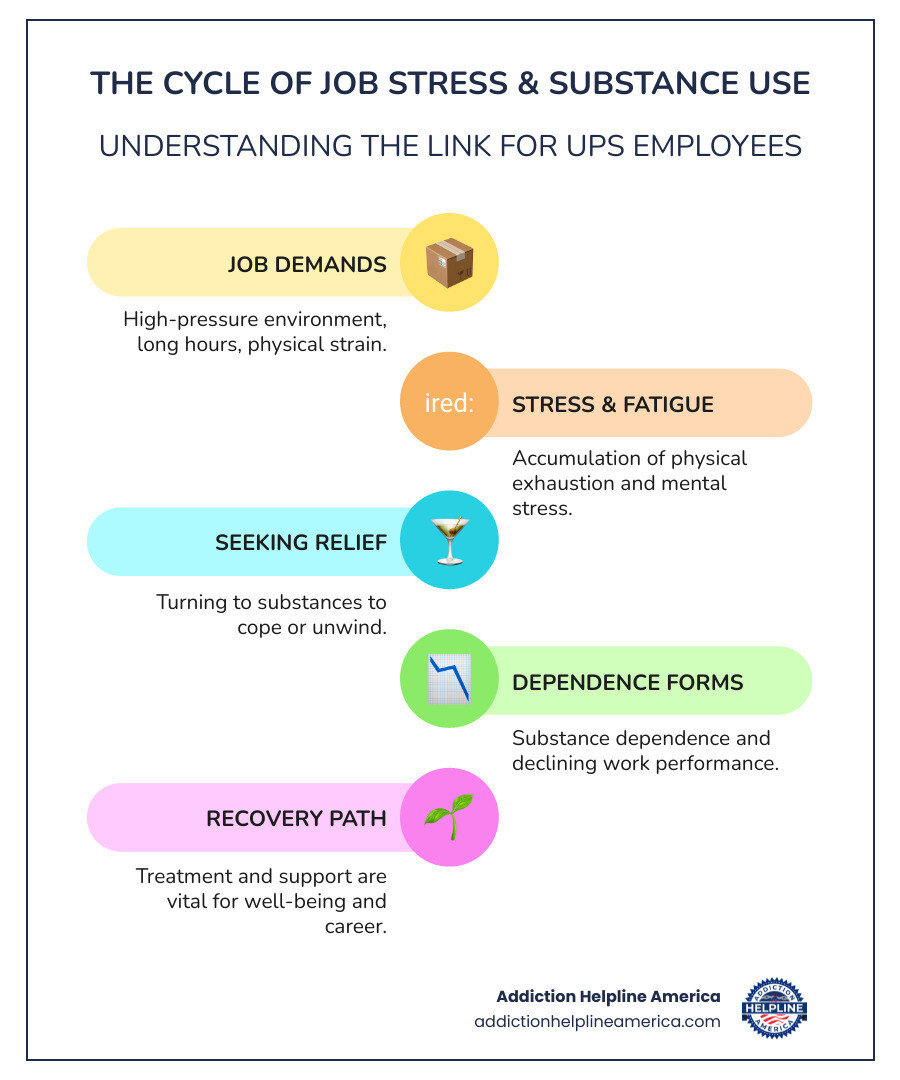
Why Understanding Rehab Options Matters for UPS Employees
Drug & Alcohol Rehab for UPS Employees is available through confidential pathways that protect your job while you get help. The demands of working at UPS—long shifts, physical strain, and tight schedules—create an environment where stress can lead to substance use as a way to cope. You’re not alone, as an estimated 10.8 million full-time U.S. workers have a substance use disorder.
Fear of losing your job shouldn’t stop you from seeking help. Here’s what you need to know:
- Job Protection: The FMLA provides up to 12 weeks of unpaid, job-protected leave for treatment.
- Confidentiality: HIPAA laws protect your medical privacy, so your employer won’t know the specific details.
- Benefits Access: Most UPS employees have Employee Assistance Programs (EAPs) and insurance that cover rehab.
- Legal Rights: The ADA protects employees who voluntarily seek treatment from being fired for getting help.
This guide explains your rights, how to use your benefits, and what treatment options work best for working professionals. Understanding these options is the first step toward recovery for yourself or a loved one.
At Addiction Helpline America, we specialize in connecting individuals seeking Drug & Alcohol Rehab for UPS Employees with treatment options while guiding them through the benefits and legal protections available.

Understanding Your Rights and Job Protections
It’s natural to worry about your job when considering rehab. However, you have significant legal protections when you seek Drug & Alcohol Rehab for UPS Employees. Federal laws like the Family and Medical Leave Act (FMLA) and the Americans with Disabilities Act (ADA), along with HIPAA’s confidentiality rules, create a safety net for your career and privacy.

Can You Be Fired for Going to Rehab?
No, you generally cannot be fired solely for going to rehab. When you voluntarily seek treatment, federal law protects you. The key distinction is between seeking help and active substance use on the job. Current illegal drug use at work is not protected and can lead to termination. However, the act of getting treatment cannot be used against you.
Your employer can still address performance issues or policy violations that occurred before you sought help. Union agreements for many UPS employees add another layer of protection, often outlining specific procedures for rehabilitation that allow you to keep your job after completing treatment. The ADA also protects employees in recovery from discrimination, meaning your employer cannot fire or refuse to promote you because you sought help. For more details, ADA, addiction, recovery, and employment resources offer helpful guidance.
Call Now – Your Journey to Recovery Begins Today!

Take the first step towards a healthier life! Call now to connect with our compassionate team and start your recovery journey today. Your path to healing awaits!
Our recovery specialists are available 24/7 to provide support, and all calls are confidential and free. Reach out anytime – we’re here to help!
Legal Protections: FMLA and ADA Explained
Two federal laws are the backbone of your job protection:
The Family and Medical Leave Act (FMLA) gives eligible employees up to 12 weeks of unpaid, job-protected leave for serious health conditions, including substance use disorder treatment. Your health benefits are maintained, and you are guaranteed your same or an equivalent position upon return. Most full-time UPS employees meet the eligibility requirements.
The Americans with Disabilities Act (ADA) prohibits discrimination against people in recovery. It recognizes addiction as a medical condition, so your employer cannot treat you unfairly for having a history of substance use or for getting help. This protection applies once you are actively in recovery, not while engaging in current illegal drug use.
These laws allow you to take the time you need for treatment without fearing for your job. For help finding programs that fit your situation, visit our Long Term Rehab Near Me Guide.
The Importance of Confidentiality
Your treatment is confidential by law. Privacy concerns should not stop you from getting help.
Employee Assistance Program (EAP): All discussions with an EAP counselor are confidential. They cannot share information with your employer without your written permission.
HIPAA Privacy Rules: Treatment centers are legally required to keep your health information private. They cannot tell your employer about your diagnosis or progress without your explicit consent.
When you take FMLA leave, you only need to inform your employer that you have a serious health condition. You do not have to disclose that it’s for substance use treatment. This privacy creates a safe space to focus on recovery. If you have questions, our Addiction & Rehab Hotlines are completely confidential.
Call Now – Your Journey to Recovery Begins Today!

Take the first step towards a healthier life! Call now to connect with our compassionate team and start your recovery journey today. Your path to healing awaits!
Our recovery specialists are available 24/7 to provide support, and all calls are confidential and free. Reach out anytime – we’re here to help!
Navigating Benefits for Drug & Alcohol Rehab for UPS Employees
As a UPS employee, you have more resources than you might realize. Your benefits package provides several pathways to access Drug & Alcohol Rehab for UPS Employees, often at little to no cost. Understanding how to use these benefits is key to getting the care you need.

Using Your Employee Assistance Program (EAP)
Your Employee Assistance Program (EAP) is your confidential first line of support. It’s a free, voluntary program that provides professional assessment, short-term counseling, and referrals to treatment for personal challenges like substance use. EAP counselors work for you, not your supervisor, and all conversations are confidential. Union-sponsored programs like TeamstersCare often provide 24/7 access. Contact your HR department or Teamsters local for your EAP’s contact information. If you need help navigating the process, our team at Addiction Helpline America can guide you.
Understanding Your Insurance Coverage for Treatment
Most UPS health insurance plans include behavioral health benefits for substance use treatment. Verifying your benefits is a critical first step. Your plan will detail what’s covered, such as detox, inpatient/outpatient rehab, and therapy. Coverage is typically based on medical necessity, as determined by a professional assessment. To learn more about the initial stages, see our guide on the Stages of Detox.
Choosing an in-network provider will result in lower out-of-pocket costs than an out-of-network one. Your deductible and copays will also affect the final cost. We can help you verify your insurance benefits and explain your coverage in plain language.
The Step-by-Step Process to Accessing Care
Here’s a straightforward, six-step process to get help:
- Acknowledge the problem. Recognizing you need help is a courageous first step.
- Contact your EAP or HR confidentially. Your EAP is the most private starting point for assessment and referrals.
- Complete a professional assessment. This determines the right level of care for you, whether inpatient or outpatient.
- Verify insurance and choose a program. We can help you find a treatment program that fits your clinical needs and insurance coverage.
- Arrange FMLA leave if necessary. If you need inpatient care, apply for FMLA leave through HR for a serious health condition.
- Begin treatment. Start your recovery journey knowing your job is protected and your benefits are in place.
We’ve guided thousands of professionals through this process. Accessing Drug & Alcohol Rehab for UPS Employees is more straightforward than you think, and we’re here to help.
Choosing the Right Rehab Program
Choosing a rehab program that fits your needs as a UPS employee is the next step. There is no one-size-fits-all solution. The right program depends on the severity of your substance use, your work schedule, and your home support system.

Inpatient vs. Outpatient: What’s Best for a UPS Employee?
This is a key decision when considering Drug & Alcohol Rehab for UPS Employees. Both options have clear benefits.
Inpatient rehab involves living at a treatment facility 24/7 for a set period (e.g., 30-90 days). This immersive environment is ideal for severe addiction, co-occurring disorders, or if you need to be removed from triggers. It requires taking time off work, which is protected by FMLA.
Outpatient rehab offers flexibility, allowing you to live at home and continue working. You attend scheduled treatment sessions, often in the evenings or on weekends. This approach works well for moderate substance use disorders when you have a strong support system at home.
| Feature | Inpatient Rehab | Outpatient Rehab |
|---|---|---|
| Time Commitment | 24/7, residential stay (30, 60, 90 days or more) | Flexible, part-time schedule (hours per week) |
| Living Situation | Live at the facility | Live at home, attend sessions at the facility |
| Intensity | High, immersive, structured | Moderate to high, allows for daily responsibilities |
| Best For | Severe addiction, co-occurring disorders, need for full removal from triggers, initial stabilization | Moderate addiction, strong support system at home, desire to maintain work/family responsibilities |
Our guide on Inpatient vs Outpatient Rehab explores these options in more detail.
Specialized Treatment for Working Professionals
Some rehab programs are designed specifically for working professionals. They understand the unique pressures of a demanding career like at UPS—physical strain, tight schedules, and performance stress. These programs focus on developing healthier coping skills for job stress, preventing burnout, and preparing you for a smooth return to work. Therapy helps you identify work-specific triggers and learn healthy ways to manage them. Our guide on Therapy in Addiction Recovery explains various effective therapeutic approaches.
Treating Co-Occurring Mental Health Conditions
Substance use often co-occurs with mental health conditions like depression, anxiety, or trauma. This is known as a “dual diagnosis.” For recovery to be successful, both conditions must be treated simultaneously. The stress of working at UPS can trigger or worsen these underlying issues. Effective treatment programs offer integrated care, addressing both your substance use and mental health through therapy, counseling, and medication management if needed. For more on this, see our Mental Wellness Support Complete Guide.
At Addiction Helpline America, we help you find a program that addresses your whole life—your job, mental health, and long-term goals.
Life After Rehab: Returning to Work and Maintaining Sobriety
Completing rehab is a major achievement, but recovery is a lifelong journey. Transitioning back to your job at UPS requires a plan and ongoing support to steer the same pressures that may have contributed to substance use in the first place.

Your Transition Back to the Job
Returning to work after Drug & Alcohol Rehab for UPS Employees can be a smooth process with preparation. Expect a confidential return-to-work agreement that outlines expectations for continued recovery and workplace safety. Follow-up testing is also standard, with the UPS collective bargaining agreement requiring at least six tests in the first year back on the job.
Communicate professionally with your supervisor or HR about any needed accommodations, but remember you don’t have to share all the details of your treatment. Setting boundaries around your time for therapy or support meetings is crucial. Don’t hesitate to ask about easing back into responsibilities, such as starting with lighter duties or shorter shifts, to protect your recovery.
Building a Strong Foundation for Long-Term Recovery
Maintaining sobriety requires a strong support system and healthy coping mechanisms. Continuing care, such as ongoing therapy and check-ins with your treatment team, is your safety net.
Support groups like Alcoholics Anonymous (AA) and Narcotics Anonymous (NA) provide a community of peers who understand your journey. Many UPS employees find meetings near their work hubs. Ongoing therapy helps you work through challenges as they arise, especially those related to workplace stress.
Developing healthy coping strategies for job stress is vital. Replace old habits with new outlets like exercise, mindfulness, or hobbies. If you ever feel overwhelmed or are in crisis, the 988 Suicide & Crisis Lifeline is available 24/7. There is no shame in reaching out for help.
Addiction Helpline America is here for your journey after rehab. We can connect you with aftercare programs and continuing support to help you succeed in your recovery.
Call Now – Your Journey to Recovery Begins Today!

Take the first step towards a healthier life! Call now to connect with our compassionate team and start your recovery journey today. Your path to healing awaits!
Our recovery specialists are available 24/7 to provide support, and all calls are confidential and free. Reach out anytime – we’re here to help!
Frequently Asked Questions about Drug & Alcohol Rehab for UPS Employees
What are the first signs that a UPS employee might need help with substance use?
The demanding nature of UPS work can mask the warning signs of a substance use issue. Key indicators include:
- Changes in attendance: More frequent call-outs, tardiness, or unexplained absences.
- Decreased job performance: An increase in delivery errors, missed deadlines, or difficulty concentrating.
- Increased accidents or errors: A rise in minor incidents or safety violations, especially in safety-sensitive roles.
- Changes in appearance or conduct: Neglected hygiene, unusual mood swings, irritability, or social withdrawal from the team.
- Financial or legal problems: Money troubles or legal issues like a DUI.
Recognizing these signs is a sign of strength and the first step toward getting support.
How much does rehab cost and will my UPS insurance cover it?
The cost of Drug & Alcohol Rehab for UPS Employees varies by program type and duration. However, your UPS insurance, especially union-affiliated plans, will likely cover a significant portion of the cost. Most plans include comprehensive benefits for substance use disorder treatment.
The key is to verify your benefits to understand your deductible, copays, and what services are considered medically necessary. Your Employee Assistance Program (EAP) can also provide confidential guidance on finding covered treatment options. If you’re concerned about costs, our Free Addiction Programs Complete Guide can point you toward low-cost or no-cost options.
Don’t let financial fears stop you from reaching out. Treatment is more accessible than you may think.
Can I keep working while attending rehab?
Yes. For many UPS employees, this is a critical factor. Outpatient rehab programs are designed for working professionals, allowing you to maintain your job while getting treatment.
- Intensive Outpatient Programs (IOPs) offer a higher level of care with flexible schedules, often with evening or weekend sessions that fit around work shifts.
- Virtual rehab options provide treatment from home through telehealth, offering maximum convenience for those with demanding hours.
If a professional assessment determines that inpatient treatment is necessary, you would need to take time off. This is where FMLA provides up to 12 weeks of job-protected leave, allowing you to focus on recovery without fear of losing your position.
Conclusion: Take the First Step Towards a Healthier Future
Understanding your options is the first step toward change. Seeking Drug & Alcohol Rehab for UPS Employees isn’t a sign of weakness—it’s a courageous choice to reclaim your future. The daily pressures of your job are real, but coping with substances only creates more problems.
Remember these key points:
- You don’t have to risk your job to get better.
- Your EAP offers free, confidential support.
- FMLA and the ADA provide job and legal protection.
- Your insurance likely covers a significant portion of treatment costs.
At Addiction Helpline America, we’ve helped thousands of working professionals steer this process. We provide free, confidential guidance to connect you with the right recovery program from our nationwide network. We understand your concerns and are here to help you find a path forward that fits your life.
Recovery is possible, and it starts with one decision. Explore our comprehensive guide to rehab centers or call us to take the next step today.
Our helpline is 100%
free & confidential
If you or someone you care about is struggling with drug or alcohol addiction, we can help you explore your recovery options. Don’t face this challenge alone—seek support from us.
Programs
Resources
Will my insurance
cover addiction
treatment?
We're ready to help
Find the best
drug or alcohol treatment
center
Are you or a loved one struggling with addiction? Call today to speak to a treatment expert.















